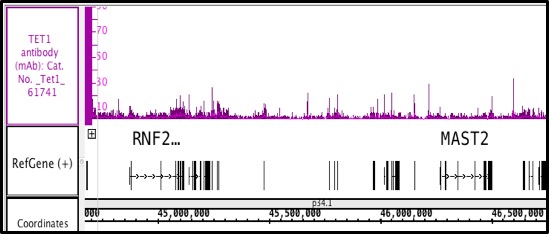Tet1 antibody (mAb) (Clone 5D6)
Host / Isotype
Rat / IgG2a
Reactivity
Human, Mouse
Applications
ChIP-Seq, ICC, IF, IP, WB
CloneNo.
5D6
Cat No : 61741,61742,61941 61741
Synonyms
验证数据展示
产品信息
| Tested Applications |
ChIP-Seq, ICC, IF, IP, WB
Applications Validated by Active Motif: ChIP-Seq: 4 ul per ChIP This antibody is also available as an AbFlex engineered recombinant antibody. For details on the corresponding AbFlex Recombinant Antibody, see Catalog No. 91171. |
| Tested Reactivity | Human, Mouse |
| Host / Isotype | Rat / IgG2a |
| Class | Monoclonal |
| Type | Antibody |
| Immunogen | This antibody was raised against a recombinant protein corresponding amino acids 1682-1914 of mouse Tet1. |
| Full Name | Tet1 antibody (mAb) (Clone 5D6) |
| Synonyms | Tet Methylcytosine Dioxygenase 1, Leukemia-Associated Protein With A CXXC Domain, CXXC6, LCX, Ten-Eleven Translocation 1 Gene Protein, CXXC-Type Zinc Finger Protein 6, Ten-Eleven Translocation-1, CXXC Zinc Finger 6, Tet Oncogene 1, EC 1.14.11.n2, KIAA1676, Methylcytosine Dioxygenase TET1, TET1 Splice Variant VP_DE456, TET1 Splice Variant VP_DE4, CXXC Finger 6, BA119F7.1, antibody, antibodies, monoclonal, mab, if, icc, ip, wb, immunofluorescence, immunocytochemistry, immunoprecipitation, western blotting, sample |
| Molecular weight | 215 kDa |
| GenBank accession number | NP_001240786 | RRID | AB_2793752 | Purification Method | Protein G Chromatography |
| Buffer | Purified IgG in PBS with 30% glycerol and 0.035% sodium azide. Sodium azide is highly toxic. |
| Storage | Some products may be shipped at room temperature. This will not affect their stability or performance. Avoid repeated freeze/thaw cycles by aliquoting items into single-use fractions for storage at -20°C for up to 2 years. Keep all reagents on ice when not in storage. |
背景介绍
Tet1 (Ten-Eleven Translocation-1; methylcytosine dioxygenase) is a protein that catalyzes the conversion of the modified genomic base 5-methylcytosine (5mC) into 5-hydroxymethylcytosine (5hmC) which can lead to cytosine demethylation by either further oxidation via Tet proteins to 5-formylcytosine (5fC) and 5-carboxycytosine (5caC) or deamination into 5-hydroxymethyluracil (5hmU) and then subsequent replacement by unmethylated cytosine by the base excision repair system. Methylation at the C5 position of cytosine bases is an epigenetic modification of the mammalian genome which plays an important role in transcriptional regulation. Tet1 preferentially binds to CpG-rich sequences at promoters of both transcriptionally active and polycomb-repressed genes. By controlling the levels of 5mC and 5hmC at gene promoters, it may regulate the gene expression silencing induced by cytosine methylation. May have a dual function by also repressing the expression of a subset of genes through recruitment of transcriptional repressors to promoters. Involved in the balance between pluripotency and lineage commitment of cells, it plays a role in embryonic stem cells maintenance and inner cell mass cell specification.

